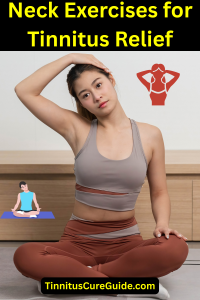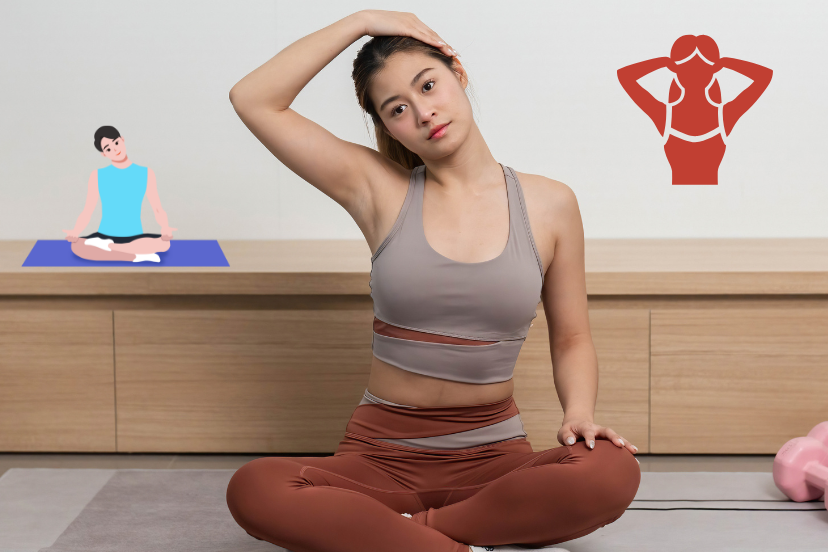Neck Exercises for Tinnitus Relief: Simple Stretches to Ease Ear Ringing
Can Your Neck Really Affect Tinnitus?
If you struggle with constant ringing, buzzing, or whooshing in your ears, you may be surprised to learn that your neck could be part of the problem. Many people report that poor posture, stiff neck muscles, or cervical spine issues can worsen tinnitus symptoms. The good news? Simple daily neck exercises for tinnitus relief may ease discomfort, improve circulation, and reduce the intensity of ear ringing.
This guide explores how neck tension and posture affect tinnitus — and offers step-by-step stretches, posture tips, and lifestyle strategies designed for real-world relief.
The Link Between Neck Tension and Tinnitus
Can Poor Posture Cause Tinnitus?
Yes, poor posture can contribute to tinnitus. When the head and shoulders slump forward (common from phone and computer use), it places extra strain on the cervical spine and tightens surrounding muscles. This tension can:
-
Compress nerves linked to hearing pathways
-
Reduce blood flow to the inner ear
-
Worsening awareness of ringing or buzzing sounds
That’s why people with neck tension and constant ear ringing often find relief through gentle stretching and posture correction.
Do Neck Stretches Help Ear Ringing?
Many tinnitus sufferers wonder: do neck stretches help ear ringing, or is it just a myth? The short answer is yes—gentle neck exercises can often make a noticeable difference, especially when tinnitus is linked to muscle tension or poor posture.
How Neck Tension Triggers Ear Ringing
-
Tight muscles in the neck and shoulders can restrict blood flow to the inner ear.
-
A strained cervical spine may compress nerves connected to hearing pathways.
-
Stress and jaw clenching (common in people with high cortisol levels) often cause the neck to stiffen, which worsens the buzzing or ringing in ears.
Benefits of Neck Stretches for Tinnitus Relief
Regular stretching can:
-
Improve circulation to the auditory system, reducing ear buzzing sounds.
-
Relax tight muscles that pull on the cervical spine and aggravate tinnitus.
-
Reduce stress hormones that fuel both neck tension and constant ear ringing.
-
Enhance posture, lowering the risk of chronic neck-related tinnitus.
Evidence from Research and Therapy
While there’s no one-size-fits-all cure, studies on somatic tinnitus (a type influenced by body movement) show that targeted cervical spine exercises for tinnitus can reduce symptom intensity. Physical therapists in the U.S. often recommend neck stretches as part of a broader tinnitus management plan alongside hearing aids, sound masking devices, and lifestyle changes.
Simple Stretches to Try at Home
If your doctor approves, start with gentle moves such as:
-
Chin Tucks: Slowly pull your chin toward your chest to align your spine.
-
Side Neck Stretch: Tilt your head to one side, holding for 15–20 seconds per side.
-
Shoulder Rolls: Rotate shoulders backward and forward to release tension.
-
Upper Trapezius Stretch: Place one hand behind your back, tilt your head away, and hold.
💡 Tip: Always move slowly—avoid quick or jerky motions, as these may increase discomfort.
👉 Key Takeaway: Neck stretches aren’t a cure for tinnitus, but for many people, they provide significant relief when constant ear ringing is connected to muscle strain, posture problems, or stress-related tension.
Best Neck Exercises for Tinnitus Relief
Here are effective, safe, and easy-to-do neck exercises for tinnitus relief you can try at home. Perform them slowly, never forcing movement. If pain worsens, stop and consult a healthcare professional.
1. Neck Rotation Stretch
-
Sit tall with shoulders relaxed.
-
Slowly turn your head to the right as far as comfortable.
-
Hold for 10 seconds, then return to the center.
-
Repeat to the left.
-
Perform 5 repetitions on each side.
2. Side Neck Stretch
-
Sit upright and gently tilt your head toward your right shoulder.
-
Use your right hand to lightly guide the stretch (don’t pull hard).
-
Hold 20 seconds. Switch sides.
-
Repeat 3 times on each side.
3. Chin Tucks (Posture Reset)
-
Sit or stand against a wall.
-
Tuck your chin gently toward your chest, as if making a “double chin.”
-
Hold 5 seconds, then relax.
-
Repeat 10 times.
4. Shoulder Rolls
-
Roll your shoulders forward in a slow, circular motion 10 times.
-
Then roll backward 10 times.
-
Helps relieve tension in the neck and upper back.
5. Upper Trapezius Stretch
-
Sit upright. Place your right hand behind your back.
-
Tilt your head to the left, stretching the opposite side of the neck.
-
Hold 20 seconds. Repeat on the other side.
Cervical Spine Exercises for Tinnitus
When tinnitus is related to the cervical spine (neck joints and discs), targeted movements can help restore mobility. Cervical spine exercises for tinnitus often include gentle range-of-motion stretches, yoga poses, and posture training.
-
Cat-Cow Pose (yoga-inspired): Improves spinal flexibility and reduces tension.
-
Wall Angels: Strengthens postural muscles, supporting better head and neck alignment.
-
Seated Neck Retractions: Helps counteract slouching from prolonged sitting.
These movements are not only good for tinnitus but also for reducing headaches, stiff shoulders, and overall stress.
Best Posture and Neck Stretches for Tinnitus Relief
Posture correction is just as important as stretching. Maintaining proper alignment throughout the day reduces strain on the auditory nerves and cervical spine.
Posture Tips:
-
Keep your computer screen at eye level.
-
Use a chair with good lumbar support.
-
Avoid cradling your phone between your shoulder and your ear.
-
Take standing or walking breaks every 30 minutes.
Pairing posture correction with neck stretches for tinnitus relief ensures longer-lasting results.
Yoga Neck Stretches for Tinnitus and Ear Buzzing
Yoga offers gentle, mindful movements that can relax both the body and nervous system. For tinnitus sufferers, yoga neck stretches for tinnitus and ear buzzing can help regulate stress while easing neck tightness.
Recommended poses:
-
Seated Neck Rolls (gentle, slow circles)
-
Child’s Pose with Arms Extended (releases tension in shoulders and neck)
-
Bridge Pose (improves circulation to the head and ears)
-
Legs Up the Wall Pose (calms nervous system and reduces stress hormones)
How to Reduce Ear Buzzing with Neck Exercises
The key is consistency. Doing a few minutes of neck exercises for tinnitus relief each day can gradually reduce ear buzzing by:
-
Improving blood flow to the inner ear
-
Releasing tension in tight cervical muscles
-
Encouraging better posture for nerve function
-
Reducing stress, which often worsens tinnitus
Many people notice that their ear ringing at night is less intense when they combine stretches with relaxation techniques like breathing exercises or sound therapy.
Lifestyle Tips to Support Neck Health and Tinnitus Relief
Tinnitus linked to neck tension often improves when you take care of your posture, stress levels, and daily habits. The right lifestyle changes can reduce constant ear ringing, improve blood flow, and ease muscle strain.
1. Maintain Good Posture
Poor posture can strain the cervical spine and trigger buzzing or ringing in the ears.
-
Keep your computer screen at eye level.
-
Avoid slouching when using a phone (“tech neck”).
-
Use an ergonomic chair with neck and lumbar support.
2. Stay Active with Gentle Movement
Regular exercise helps circulation and keeps neck muscles flexible.
-
Try low-impact activities like walking, swimming, or yoga.
-
Add cervical spine exercises for tinnitus 3–4 times per week.
-
Take short stretch breaks if sitting for long periods.
3. Manage Stress and Cortisol Levels
Stress raises cortisol, which can intensify tinnitus.
-
Practice mindfulness or deep breathing for 5 minutes daily.
-
Try progressive muscle relaxation before bed.
-
Consider yoga neck stretches for tinnitus and ear buzzing to calm both body and mind.
4. Sleep in a Neck-Friendly Position
Poor sleep posture can worsen neck tension.
-
Use a supportive pillow that keeps your neck in a neutral position.
-
Avoid sleeping on your stomach (it twists the neck).
-
Try a cervical or memory foam pillow for added comfort.
5. Stay Hydrated and Eat Anti-Inflammatory Foods
Dehydration and inflammation may worsen both tinnitus and muscle tightness.
-
Drink 6–8 glasses of water daily.
-
Include foods rich in magnesium (spinach, almonds) and omega-3s (salmon, chia seeds).
-
Limit caffeine and processed foods, which may trigger ear ringing in sensitive people.
6. Limit Screen Time and Take Breaks
Prolonged screen use contributes to neck stiffness and tension headaches.
-
Follow the “20-20-20” rule: every 20 minutes, look 20 feet away for 20 seconds.
-
Do simple neck exercises for ringing in the ears during breaks.
7. Consider Heat or Cold Therapy
Alternating heat and cold packs can ease muscle tension and improve circulation.
-
Apply a warm compress to loosen tight muscles.
-
Use an ice pack for inflammation after long workdays.
👉 Key Takeaway: Small daily changes—better posture, stress control, and hydration—work hand in hand with neck exercises for tinnitus relief to reduce constant ear buzzing and improve overall well-being.
Lifestyle Do’s and Don’ts for Neck Health & Tinnitus Relief
| ✅ Do’s | ❌ Don’ts |
|---|---|
| Maintain good posture at your desk and while on your phone | Slouch or hunch over screens for long periods |
| Perform gentle neck stretches and cervical spine exercises 3–4 times per week | Overstretch or do sudden, jerky movements that strain the neck |
| Practice stress-reducing habits like yoga, breathing exercises, or meditation | Let stress build up, raising cortisol and worsening ear buzzing |
| Sleep with a supportive cervical or memory foam pillow | Sleep on your stomach, which twists the neck |
| Stay hydrated and eat magnesium- and omega-3-rich foods | Overconsume caffeine, alcohol, or processed foods |
| Take frequent breaks from screen time (20-20-20 rule) | Work at a computer or phone for hours without breaks |
| Use heat or cold packs for sore neck muscles | Ignore neck pain until it develops into chronic tension |
Daily Neck Care Routine for Tinnitus Relief
Building small habits into your day can ease neck tension and reduce constant ear ringing. Here’s a simple routine you can follow morning, workday, and evening:
🌅 Morning Routine
-
Gentle Neck Stretch (2–3 minutes): Slowly tilt your head side-to-side and forward-backward.
-
Hydrate: Drink a glass of water to support circulation and muscle flexibility.
-
Posture Check: Adjust your pillow and workstation to avoid neck strain.
💻 During the Workday
-
20-20-20 Rule: Every 20 minutes, look 20 feet away for 20 seconds.
-
Mini Stretch Breaks (5 minutes): Perform simple cervical spine exercises for tinnitus, such as shoulder rolls and chin tucks.
-
Stay Relaxed: Try a 2-minute breathing exercise to reduce cortisol and stress hormone spikes.
-
Ergonomic Setup: Keep your computer screen at eye level and sit upright with feet flat.
🌙 Evening Wind-Down
-
Yoga Neck Stretches: Gentle poses like Cat-Cow or Child’s Pose release neck tension.
-
Heat Therapy (10 minutes): Apply a warm compress to loosen tight muscles.
-
Relaxation Routine: Practice mindfulness or listen to tinnitus sound therapy apps (white noise, ocean waves) before bed.
-
Sleep Smart: Use a cervical or memory foam pillow and avoid stomach sleeping.
👉 Key Tip: Following this daily neck care routine consistently can improve posture, lower stress hormones, and enhance the effectiveness of neck exercises for tinnitus relief.
When to See a Doctor
Neck exercises can be highly beneficial, but professional care is important in certain cases. See a doctor or physical therapist if:
-
Tinnitus starts suddenly in one ear
-
Ringing is accompanied by hearing loss, dizziness, or vertigo
-
Neck pain is severe or worsening
-
Exercises increase pain or symptoms
-
You suspect a neck injury or cervical spine disorder
Medical evaluation ensures your tinnitus isn’t related to another condition and helps you find the best treatment plan.
❓ FAQs About Neck Exercises for Tinnitus Relief
1. Do neck stretches really help with ear ringing?
Yes. Neck stretches can reduce tension in the cervical spine and improve blood flow, which may ease constant ear ringing. While they are not a cure, they often provide relief when tinnitus is linked to posture or muscle strain.
2. How often should I do neck exercises for tinnitus relief?
Most people benefit from gentle neck stretches 3–5 times per week. Daily consistency can improve flexibility, reduce tension, and help manage ear buzzing symptoms. Always start slowly and consult a healthcare provider if pain occurs.
3. Can poor posture cause tinnitus symptoms?
Poor posture, especially slouching or “tech neck,” can strain cervical muscles and nerves that affect hearing. Over time, this may contribute to constant ear ringing. Correcting posture and adding neck exercises often helps reduce tinnitus flare-ups.
4. Which neck exercises are best for tinnitus relief?
Effective exercises include chin tucks, shoulder rolls, and gentle side stretches. These movements relax tight muscles, improve circulation, and support cervical alignment. A physical therapist may recommend specific cervical spine exercises tailored to tinnitus sufferers.
5. Are yoga neck stretches useful for ear buzzing relief?
Yes. Yoga poses such as Child’s Pose, Cat-Cow, and seated neck rolls relax muscles and reduce stress hormones, both of which may ease tinnitus. Yoga also improves posture, making it a natural tinnitus management tool for many people.
6. Can neck tension and jaw clenching worsen tinnitus?
Absolutely. Stress-related habits, such as jaw clenching and stiff neck muscles, can trigger or worsen ear ringing. Combining relaxation techniques with neck exercises for tinnitus relief may reduce both muscle tightness and buzzing sounds in the ears.
7. When should I avoid doing neck exercises for tinnitus?
Stop neck exercises if they cause sharp pain, dizziness, or increased tinnitus symptoms. People with spinal injuries or severe arthritis should consult a healthcare provider first. Safety and gentle movements are key for effective tinnitus relief.
Conclusion: Take Control of Tinnitus with Neck Health
The connection between your neck and tinnitus is real. Tight muscles, poor posture, and cervical spine strain can all make ear ringing worse. Fortunately, neck exercises for tinnitus relief — paired with posture correction and stress management — offer a safe, natural way to reduce symptoms and regain comfort.
Start small, stay consistent, and remember: every stretch brings you closer to a calmer, quieter life.
Disclaimer
This article is for informational purposes only and is not a substitute for medical advice. Always consult with a qualified healthcare provider before beginning new exercises, treatments, or supplements for tinnitus relief.

- Ear Ringing After Loud Noise Exposure
- When Neck Tightness Causing Ear Ringing
- Somatic Tinnitus Causes and Treatments





